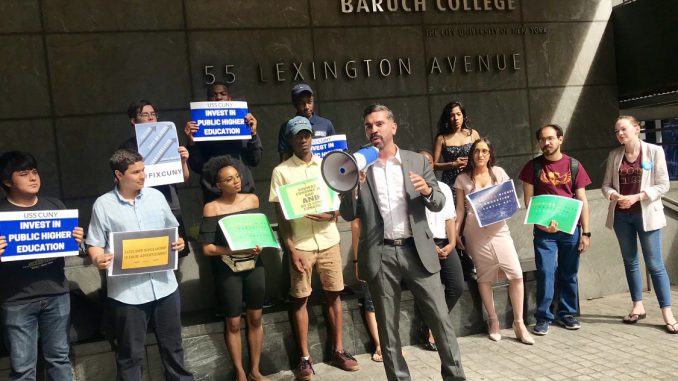
Students protest $200 increase, call for renewed funding
While CUNY students were enjoying their summer, the CUNY Board of Trustees voted to increase senior college tuition by $200, adding to other increases over the past view years.
“The core issue is underfunding,” said Corrinne Greene, student activist and delegate-elect to the United Student Senate (USS).
The July increase is part of a deal between New York State and the CUNY board called the “Rational Tuition Plan” signed into law by Governor Andrew Cuomo in the summer of 2011. The plan was intended to move away from a system of sudden and unpredictable changes in tuition so that “students and parents will be able to reasonably plan for college expenses instead of being subject to the dramatic tuition increases and uncertainty of the past,” as per an article on the Governor’s website from August 2011. The plan was initially meant to last only five years, but tuition increases have increased every fiscal year since then.
Greene seconds a sentiment from Haris Khan, the only student who sits on the Board of Trustees. Khan calls Cuomo’s deal the “Irrational Tuition Plan,” as it continuously puts financial pressure on CUNY students who already have issues paying for their education.
“We are set up to be disenfranchised,” said Greene, who helped organize a protest on the day the board voted 9-2 to enact the $200 tuition increase for four-year colleges.
The rally was small and ultimately unsuccessful, with only a few dozen students taking part.
“CUNY students have gotten tuition freezes in the past, but it requires mass mobilizations and coalitions,” said Greene.
The major student coalition intended to fight for CUNY and SUNY funding, as well as halting tuition increases, is the New York Public Interest Research Group (NYPIRG), which hosts annual student mobilizations to Albany to lobby state officials.
“This is the most important time for activists and students want to make their voices heard in 30 years,” said Jon Gaffney, one of NYPIRG’s BC organizers, to the now-defunct Kingsman newspaper in February of this year.
That February’s event was ultimately cancelled due to winter storm issues and never rescheduled.
New York State’s declining higher education budget and rising tuition are part of a national trend where public college budgets are being slashed all across the United States. Most recently, Alaska’s public university system faced a 41% budgeting slash this summer.
CUNY underfunding is a long and well documented issue, not just by politicians and journalists, but also by the sorry state of many CUNY campuses. Brooklyn College is light years away from an exception to that. With adjunct professors continuing their campaign for higher salaries, among many other structural issues, it may wind up being students who are hit with the bill.
“CUNY needs more public funding, not endless tuition increases,” said Professional Staff Congress (PSC) President Barbera Bowen in a statement following the BoT’s decision.
Despite the rationale for the “Rational Tuition Plan” being to standardize tuition increases, the tuition increase still came as a surprise to many. With only an e-mail sent mid-summer break to inform students that they and their parents would once again be adding a few hundred dollars to their college tuition payments.
“Accountability extends to student leadership,” said Greene.
“It’s shameful @CUNY to raise tuition & for the State decrease per student funding by 18% since 2008,” tweeted Haris Khan. Khan, alongside de Blasio appointee Michael Arvanites, was one of only two no votes to the tuition hike. Khan was not available for further comment before press time.
It is unknown for certain whether there will be any further tuition increases for CUNY students in the coming years. Specific alternatives to students paying the tuition have yet to arise, although Corrinne Greene references the state and city plan that would have helped Amazon.com open offices on Long Island City, a plan that fell through after intense opposition, as an example of funding that should be reallocated to higher education.
“Our schools should be quality, and they should be funded,” said Greene.
